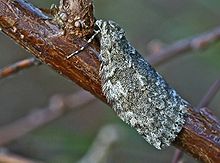November moth
| November moth | |
|---|---|

| |
| Scientific classification | |
| Domain: | Eukaryota |
| Kingdom: | Animalia |
| Phylum: | Arthropoda |
| Class: | Insecta |
| Order: | Lepidoptera |
| Family: | Geometridae |
| Genus: | Epirrita |
| Species: | E. dilutata
|
| Binomial name | |
| Epirrita dilutata (Denis & Schiffermüller, 1775)
| |
The November moth (Epirrita dilutata) is a moth of the family Geometridae. The species was first described by Michael Denis and Ignaz Schiffermüller in 1775. It can be found in the Palearctic realm in western Europe from central Scandinavia to the Mediterranean the Caucasus and western Russia.
The wingspan is 38–44 mm, the forewings being variably marked with alternating pale and dark bands. The forewing ground colour is pale with darker grey and tinted brown. It has wavy lines. The hindwing is white grey with two lines. The distal fascia points in to the discal spot. Melanism is common and in some locations all-dark individuals make up the majority of the population. The species is extremely similar to three of its relatives, the pale November moth, the autumnal moth and the small autumnal moth and they cannot usually be separated without examination of the genitalia. See Townsend et al.[1]
The November moth flies at night from September to November[1] and is attracted to light and sometimes to nectar-rich flowers.
The caterpillar is green with red markings and feeds on a wide range of trees and shrubs. The species overwinters as an egg.
Recorded food plants
[edit]- Acer - maple
- Betula - birch
- Corylus - hazel
- Crataegus - hawthorn
- Fraxinus - ash
- Malus - apple
- Prunus
- Quercus - oak
- Ulmus - elm
Notes
[edit]- ^ The flight season refers to the British Isles. This may vary in other parts of the range.
References
[edit]- ^ Martin C. Townsend, Jon Clifton and Brian Goodey (2010). British and Irish Moths: An Illustrated Guide to Selected Difficult Species. (covering the use of genitalia characters and other features) Butterfly Conservation.
- Chinery, Michael Collins Guide to the Insects of Britain and Western Europe 1986 (Reprinted 1991)
- Skinner, Bernard Colour Identification Guide to the Moths of the British Isles 1984
External links
[edit]- November moth at UKMoths
- Fauna Europaea
- Lepidoptera of Belgium
- Lepiforum e.V.
- De Vlinderstichting (in Dutch)
